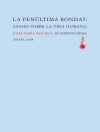The End of Russian Philosophy describes and evaluates the troubled state of Russian philosophical thought in the post-Soviet decades. The book suggests that in order to revive philosophy as a universal, professional discipline in Russia, it may be necessary for Russian philosophy to first do away with the messianic traditions of the 19th century.
Tabela de Conteúdo
Acknowledgements Remarks on Transliteration and Translation List of Figures 1. Introduction 2. What is Russian Philosophy? 3. The Philosophical Boom: the 1990s 4. Writing the History of Russian Philosophy 5. The End of the History of Russian Philosophy: the 2000s 6. The End of the Russian Idea: Sergey Horujy and Valery Podoroga 7. The End of the Intelligentsia: the Future of the Philosopher in Russia 8. Conclusion Bibliography Index
Sobre o autor
Alyssa De Blasio is Assistant Professor in the Russian Department at Dickinson College, Carlisle, PA, where she also contributes to the Philosophy Department and the Film Studies program. Her work on Russian philosophical thought has been supported by the American Council of Learned Societies, the National Endowment for the Humanities, Fulbright-Hays, the Yegor Gaidar Foundation, and the American Council of Teachers of Russian. She has published articles and film reviews in the
Russian Review, Studies in East European Thought, Studies in Russian and Soviet Cinema, Kinokultura, and
Epistemologiia i filosofiia nauki (Epistemology and the Philosophy of Science).












